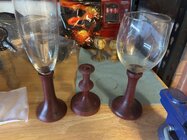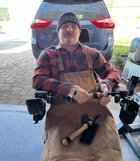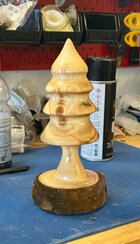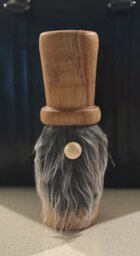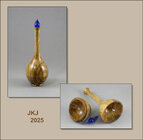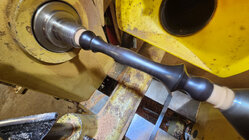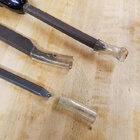Hi Chris! I admire your spirit and drive!
I had a good friend, Bruce, who was quad from an accident. His hands didn't work, as you described, no grip or mobility, but he had movement in his arms and shoulders. Like you, didn't let things stop him! He didn't turn wood but was one of the best artists I knew - I have several of his drawings and paintings. We adapted things to help hold brushes and pencils, thins with thin, smooth metal bent to his hand shape. His paintings were amazing - he painted LARGE portraits, painting the lower half first then had someone rotate the canvas so he could paint the top half upside down! Bruce wasn't interested in woodturning but I did make some things for him, including a heavy pencil holder for his desk - if the pencils were splayed out enough he could jam one between two fingers to write and sketch. What an inspiration to me.
In later years he used a stand-up chair, modified a van with a lift. He could drive with the aid of a spinner ball and custom hand/arm controls for accelerator and brakes. I helped him build an elevator for his house but Bruce was fiercely independent and did a lot by himself. He used velcro sometimes!
What are you using now to help hold on to the tools? I'm wondering if custom shaped/carved handles could be made to help keep the tools in position in your hands and make them more secure when using arm movements. I'm trying to imagine how I might hold onto a spindle gouge or hunter tool without gripping with my fingers. Might need to experiment!
Are you a member of a local turning club? If so, someone there may have some ideas for custom handles if you think that might help. (I'm imagining a shaped handle that fit your hand could help keep the cutting edge in the right position, keeping the handle from turning a bit and interfering with the optimum cutting edge presentation.)
What tools do you you the most now? Looks like you might be holding a flat-top carbide tool. I don't use those but I am a huge fan of Hunter carbide tools - in case you're not familiar with them, they use replaceable round dished cutters, secured with a screw, that are incredibly sharp - they can make smoother cuts since they can cut like a spindle gouge, bowl gouge, or a scraper. One great thing is they never need sharpening - the cutters are rotated occasionally to spread the wear around the bit - when one finally gets dull it's easily replaced. I use them a lot, especially certain types. I think used the first one I had for about a year before I had to replace the cutter. I use them on bowls, platters, all kinds of utility turnings, boxes, a variety of spindles. Give me a Hunter Hercules (the small one), a parting tool, a custom point tool, and a few custom negative rake scrapers, and I can turn almost anything.
